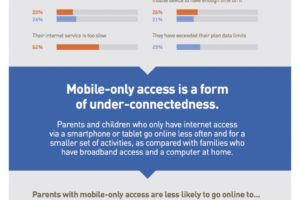[Editor’s Note: Read “Infographic: The edtech challenges faced by immigrant students” here.]
Although most children in families earning below the median U.S. household income have internet access and devices that connect to it, they struggle with being “under-connected.”
Ninety-four percent of families surveyed by the Joan Ganz Cooney Center at Sesame Workshop, have some kind of internet access and most have at least one device connecting to the internet, but the quality or consistency of their internet access is lower than they would like it to be.
In fact, in the past 12 months from when the survey was conducted, 20 percent of families with home broadband access and 24 percent with mobile-only access had their services cut off due to inability to pay.
More than half (52 percent) of those with home broadband said they internet service is too slow, and 29 percent with mobile-only access exceeded their plan data limits.
(Next page: Why mobile-only access is detrimental to some students)
Access to Devices an Issue
Access to devices is another issue, with 26 percent of those with home broadband access and 21 percent of those with mobile-only access claiming that too many people share the computer or mobile device.
Mobile-only access is itself a form of under-connectedness.
“Parents and children who only have internet access via a smartphone or tablet go online less often and for a smaller set of activities, as compared with families who have broadband access and a computer at home,” according to the research.
Parents with mobile-only access are less likely to go online to look for information, keep up with local news, bank or pay bills, apply for jobs and services, or shop.
Children ages 6-13 with mobile-only access are less likely to use the internet or computers on a daily basis, play digital educational games, do homework on the computer or internet, or look up things they are interested in online.
Families with mobile-only access are more likely to live below the federal poverty level and are more likely to be immigrants.
Because parents with computers use the internet for a broader range of tasks than those who are mobile-only, “it is significant that more educated parents are more comfortable using computers, even among parents who have access to both devices.”
Seventy-nine percent of college-educated parents are more confident using computers instead of a mobile device, compared to 39 percent of those with less than a high school education.
See all the data below (click to enlarge image).
- Friday 5: Virtual field trips - April 26, 2024
- Google, MIT RAISE launch no-cost AI training course for teachers - April 26, 2024
- 4 ways to support work-based learning - April 23, 2024



